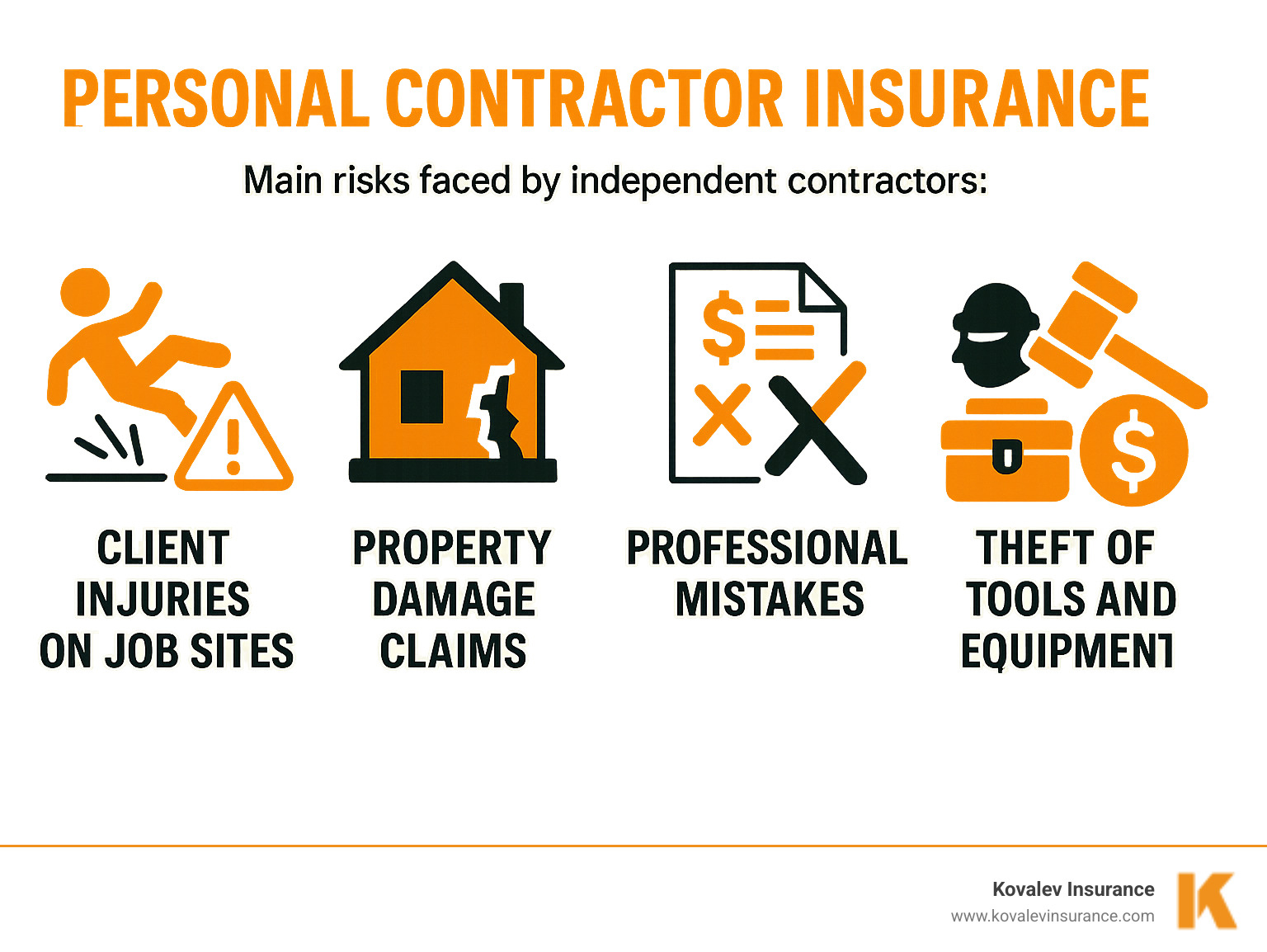Blog Content
30
Jul
2025

Personal contractor insurance is a crucial suite of business insurance policies specifically designed for the unique risks faced by independent contractors, freelancers, and sole proprietors. In a business structure where there is no legal distinction between the individual and the company, this insurance acts as a vital firewall, safeguarding both your professional operations and your personal assets—like your home, car, and savings—when work-related claims inevitably arise.
Key components that form a comprehensive shield include:
From a plumber working in historic Newton homes to an IT consultant serving businesses in the Wellesley tech corridor, operating without insurance in Massachusetts is a significant financial gamble. The state's combination of high property values and a litigious environment means a single mishap can have devastating consequences, potentially wiping out your personal savings. It's a common misconception that personal auto or homeowners policies will cover business-related incidents. They won't. A slip-and-fall accident at a client's home in Belmont or a bad professional recommendation given in Needham requires coverage built for business risks.
I’m Michael Kovalev of Kovalev Insurance Agency. With over a decade of experience protecting more than $1 billion in Massachusetts property, I’ve witnessed how the right personal contractor insurance provides the foundation that allows independent tradespeople to build their businesses on solid financial ground.

Think of it as a custom-fitted suit of armor for your business. It’s a package of policies selected to match your specific trade and risks. Your homeowner’s policy won’t pay if a client trips over your toolbox on their property, and your personal auto insurance won’t cover a fender bender on the way to a supply store for a job. Personal contractor insurance is specifically designed to fill these critical gaps, ensuring that business risks don’t threaten your personal financial security—your house, retirement funds, or your family’s budget.

Accidents, errors, and injuries are part of the business landscape. A robust personal contractor insurance plan is built on a foundation of core policies that address these primary risks. These three coverages form the non-negotiable backbone of protection for nearly every contractor.
Often called the cornerstone of any business insurance plan, General Liability (GL) protects you from a wide range of common claims. It covers incidents that happen at your job site or as a result of your operations.
Covers:
Most contractors in Massachusetts opt for a standard limit of $1 million per-occurrence / $2 million aggregate, as this is often the minimum required by commercial contracts.
More details: General Liability Coverage Massachusetts
While General Liability covers physical damages, Professional Liability (also known as Errors & Omissions or E&O) protects against financial losses your clients suffer because of your work, advice, or designs. It's crucial for any contractor who provides expert guidance. For an IT consultant in the Greater Boston area, this could cover a lawsuit from a client who suffered a data breach after following your security advice. For an architect or designer, it could be a claim for a design flaw that required costly rework. It covers negligence, missed deadlines, and professional mistakes.
Learn more: Professional Liability Insurance Massachusetts
This coverage is a legal requirement in Massachusetts if you have any employees, even part-time ones. It is governed by state law and provides two main benefits: it pays for medical bills and a portion of lost wages for employees who get injured on the job, and in return, it protects you from being sued by that injured employee. According to the state government, failure to carry workers' comp can result in heavy fines and stop-work orders. You can find official information on the state's requirements on the Massachusetts government website. For sole proprietors with no employees, a standard policy isn't required, but many general contractors will require you to show proof of coverage. In these cases, you can often purchase an affordable “ghost policy” to meet contractual obligations and protect yourself if your personal health insurance excludes work-related injuries.
Info: Worker Compensation Insurance Massachusetts

Insurance premiums are not one-size-fits-all; they are custom to your specific business. While costs vary, understanding the factors that influence your price can help you manage your expenses. Most low-risk Massachusetts contractors can expect to fall within the following ranges.
These figures are estimates. The only way to know your exact cost is to get a personalized quote based on your unique business profile.
Get an exact quote: Business Insurance Quotes Massachusetts
While the core policies cover the most common risks, certain trades and projects require extra layers of protection. An experienced agent can help you identify these needs and add specialized endorsements or policies to close any coverage gaps.
A common and dangerous mistake for contractors is assuming their personal auto policy covers work-related driving. It does not. If you're in an accident while driving to a job site, picking up supplies, or meeting a client, your personal insurer can deny the claim. Commercial auto insurance is essential and covers liability for accidents, as well as physical damage to your vehicle. Key coverages include liability, collision, comprehensive, and hired/non-owned auto coverage, which protects you when you or your employees use rented vehicles or personal cars for business errands.
Details: Best Massachusetts Commercial Auto Insurance.
Your tools are your livelihood. This policy, often called Inland Marine insurance, protects your valuable gear wherever it is—in transit, on a job site, or stored in your vehicle. It covers losses from theft, fire, or vandalism, which is vital when a stolen toolbox from your truck in Belmont could bring your work to a complete halt. Coverage can be structured to cover a blanket amount for smaller hand tools and can also schedule specific, high-value items like generators or specialized diagnostic equipment to ensure they are covered for their full replacement value.
Info: Artisan Contractors Insurance Massachusetts.
Nearly every contractor stores sensitive client data, whether it's names, addresses, project plans, or payment information. If your system is hacked or a laptop is stolen, you could be liable for the data breach. Cyber liability insurance is no longer just for tech companies. It helps pay for critical recovery costs, including forensic investigation, notifying affected clients, providing credit monitoring services, and legal defense if you are sued.
For contractors involved in new construction or significant renovations, a standard liability policy isn't enough. Builder's Risk insurance is a specialized form of property insurance that protects the structure and materials on-site during the construction process. It covers losses from perils like fire, wind, theft, and vandalism. Typically, the policy is purchased by either the contractor or the property owner and remains in effect until the project is complete and the property is ready for use.
Learn more: What is Builders Risk Insurance Massachusetts

Navigating insurance can feel complex, but a systematic approach can ensure you get the right protection at the best value. Working with an independent agent who understands the Massachusetts market is key.
If an incident occurs, a calm and methodical response is crucial.
Fundamentally, they use the same core policies (General Liability, Professional Liability, etc.). The term personal contractor insurance emphasizes that the package is specifically custom for a sole proprietor or independent contractor. For these business structures, there is no legal separation between business and personal assets. Therefore, the insurance package is structured as a critical firewall to prevent a business lawsuit from seizing personal assets like your home, savings, and vehicle.
There's no single answer, as it depends entirely on your specific situation. The key factors are your trade's risk level (a roofer needs more coverage than a writer), the value of your contracts, and specific client requirements. Most commercial contracts in Massachusetts will require, at a minimum, a General Liability policy with limits of $1 million per occurrence and $2 million aggregate. The best approach is to discuss your operations with an insurance agent who can recommend appropriate limits for your exposure.
No, and this is a critical point of risk management. Your General Liability policy covers your own work and your liability, not the work of your subcontractors. You should always require any subcontractor you hire to provide you with a Certificate of Insurance (COI) showing they have their own General Liability and Workers' Compensation policies. Furthermore, you should request to be named as an \"additional insured\" on their policy. This ensures that if their work causes a claim, their insurance policy will respond first, not yours.
A Business Owner's Policy, or BOP, is a package deal that bundles two essential coverages: General Liability and Commercial Property Insurance. It's often sold at a lower premium than buying the policies separately. A BOP is an excellent choice for contractors who own or rent a small office or workshop, or have a significant amount of tools and equipment to protect from theft, fire, or other damage.
This is a very common and standard request in the contracting world. Being named as an \"additional insured\" on your policy extends your liability coverage to your client, but only for claims arising out of your work for them. For example, if your client gets sued because a visitor tripped over your materials at their property, your policy would defend them. Most insurance carriers offer this coverage, sometimes for a small flat fee or as part of a blanket endorsement that covers all clients for whom it's required by contract.
You worked hard to build your independence—don't let a single accident, lawsuit, or stolen piece of equipment erase years of effort. The right personal contractor insurance is more than just an expense; it's a strategic investment in your stability, your professionalism, and your peace of mind. It demonstrates to clients that you are a serious, reliable professional who stands behind your work.
At Kovalev Insurance, we specialize in crafting fast, affordable, and custom insurance solutions for contractors across Newton, Wellesley, Brookline, Needham, Belmont, Natick, and all of Massachusetts. We understand the unique risks you face in the local market. We won't sell you coverage you don't need. Instead, we'll work with you to build a policy that fits your specific trade and budget—nothing more, nothing less.
Protect your business, your assets, and your hard-earned freedom. Let's build your shield today.
Get a quote for your artisan contractor insurance today and keep your future secure.
X